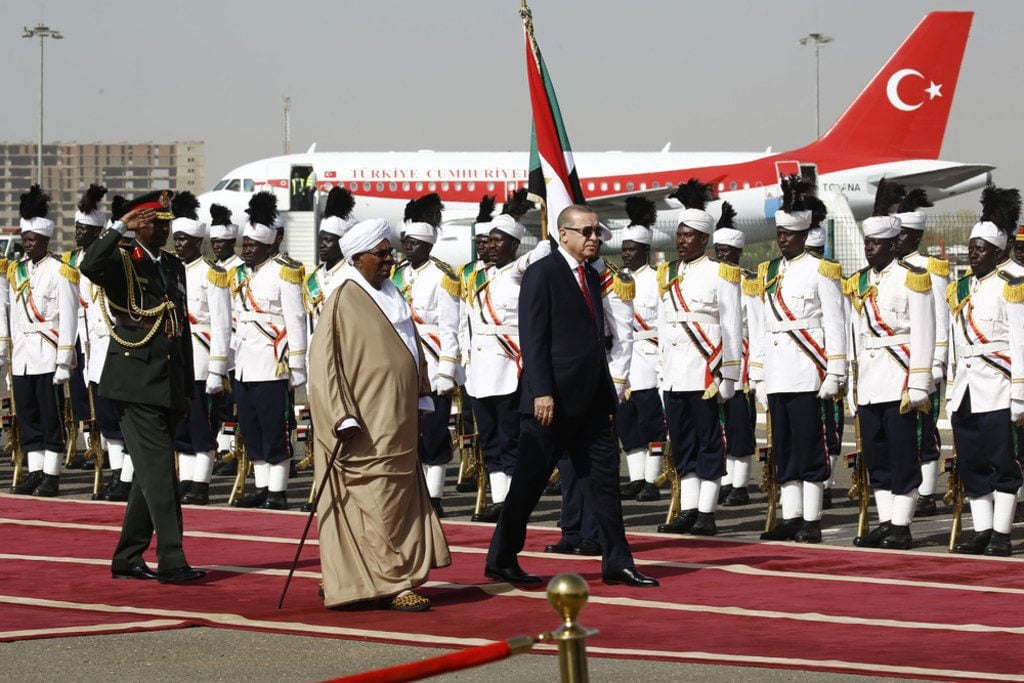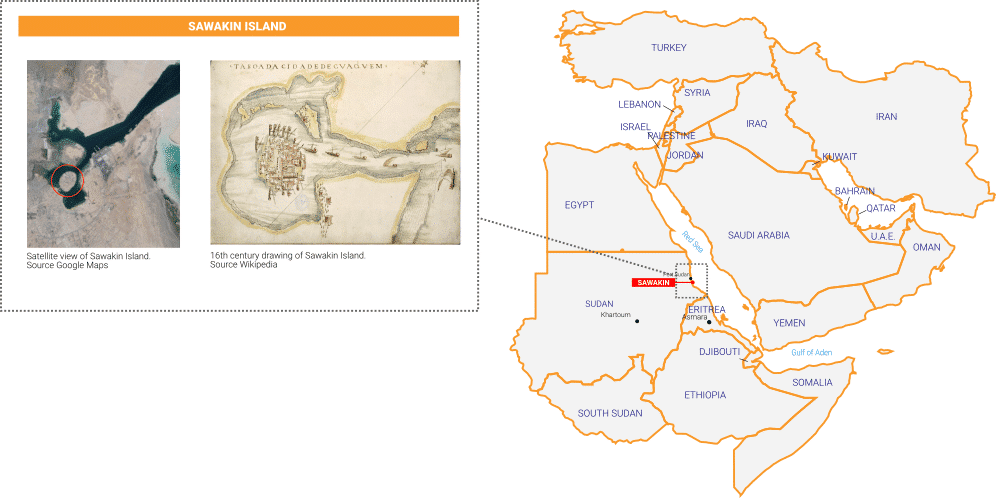The forgotten Sudanese island of Sawakin has become headline news in recent weeks, after a controversial deal was signed under which Turkey will manage and develop the island’s historic port for an undefined period of time. The deal was announced by Turkish President Recep Tayyip Erdogan, following a visit to the port with Sudanese President Omar al-Bashir on 24 December 2017. Sawakin was once under Ottoman rule, and Erdogan’s visit has dredged up painful memories in the already troubled Red Sea region and raised fears that the island will be turned into a Turkish military base.
At a press conference with his Turkish counterpart after the Sawakin deal was signed, Sudanese Foreign Minister Ibrahim Ghandour appeared to confirm these fears, saying that Sudan and Turkey had signed military and security cooperation agreements, including “the establishment of a dock for the maintenance of civilian and military vessels”. He added: “The Sudanese ministry of defence is open to military cooperation with any party, and we have military cooperation with friendly countries. Turkey is one of these countries, and we have a long history of good relations with it. We have signed an agreement that could result in some type of military cooperation. Sudan is interested in the security of the Red Sea, and we coordinate with our neighbours in that regard.”
For his part, the Turkish Foreign Minister Mevlut Cavusoglu noted that “agreements have been signed on the security of the Red Sea”, and stressed that Ankara is interested in the security of Sudan, Africa and the Red Sea region in general. We have received directives from the Turkish president to provide support for the Sudanese security forces, police and military, and we will continue to develop relations in the defence industries.”
Erdogan arrived in the Sudanese capital Khartoum along with nine ministers and more than 200 businessmen, the first Turkish president to visit Sudan since its independence in 1956. More than 20 agreements were signed during the visit, including on building a new airport in Khartoum and private sector investments in cotton production, power generation, grain silos and slaughterhouses, with the purpose of increasing the volume of trade between the two countries to $10 billion per year.

TurkPress news agency said Ankara also agreed to exempt Sudanese nationals from entry visa fees to Turkish territory. This makes Turkey the only country to welcome Sudanese nationals with such hospitality, a show of international support that Khartoum desperately needs.
Erdogan’s visit also included a tripartite meeting between the chiefs of staff of the armies of Sudan, Turkey and Qatar. The attendance of the Qatari chief of staff can only be interpreted as a clear show of support for the beleaguered Gulf state, which has been cut off by Saudi Arabia, the United Arab Emirates (UAE), Bahrain and Egypt over its alleged support for terrorism since June 2017.
Regional and Local Concerns
Anxious reactions to the handover of Sawakin came as no surprise to anyone, given the current regional tensions. The war in Yemen on the east coast of the Red Sea has been ongoing for three years, with no end in sight. Turkey’s manoeuvering, which is at odds with many of its powerful neighbours, notably Saudi Arabia, has been interpreted as a threat to their position.
The Egyptian press, which usually speaks for the government, described Erdogan’s visit to Sudan, and specifically the handover of Sawakin, as a means to undermine Egyptian national security and suggested that the Sudanese government was complicit in trying to achieve the same goal. This position is not strange, given that the Egyptian authorities believe Ankara supports the Muslim Brotherhood in Egypt, which Cairo regards as its sworn enemy. In addition, Egypt is embroiled in a dispute with Sudan over the Halayeb Triangle, a mineral-rich border area, as well as access to Nile water.
Saudi Arabia’s Okaz newspaper expressed a similar view, reminding Khartoum of the efforts made by Riyadh to lift American sanctions imposed on Sudan, and warning of Turkey’s ambitions in Sudan and the Red Sea region. The newspaper noted that, more dangerously, Sawakin is opposite the Jeddah Seaport, which Erdogan views as symbolic of the time of the Ottoman Empire.
Similarly, the UAE said through Anwar Gargash, its minister of state for foreign affairs, that the ongoing geostrategic rivalry underscores the urgent need to strengthen the Arab axis, represented by Riyadh and Cairo. In a tweet, Gargash wrote that the regional competition for dominance must be confronted by Arabs themselves. He stressed that the Arab world ‘will not be led by Tehran or Ankara’ but by the Arab capitals combined.
The Sudanese partnership with Turkey is also a clear message to Saudi Arabia and its allies that Khartoum is dissatisfied with the returns, particularly financial, it is getting from the ‘the Arab alliance’ in Yemen, especially at a time when Sudanese troops engaged in the conflict are suffering more casualties.
However, President al-Bashir also made it clear in his new year’s speech that his government has no plans to withdraw its forces from Yemen, in an attempt to keep its options open. The chief of staff of the Sudanese army visited Saudi Arabia in late January 2018 for talks with his Saudi counterpart.
Speaking from the Eritrean capital Asmara, which is closer to Sawakin than Khartoum, Eritrean President Isaias Afwerki expressed his concern over the Turkish presence and activity in the Red Sea. He said in an interview with Eritrean Television, “The military presence in Sawakin is not acceptable … Turkey is implementing the agenda of the Muslim Brotherhood in the Red Sea, supported by the forces of global hegemony, and it seeks to impose its influence in the region.”
Qatar has been one of the only countries to approve the island deal. The pro-Qatari government newspaper al-Sharq wrote, ‘Erdogan is besieging the countries boycotting Qatar’. The newspaper considered the Turkish step to be part of the frenzied international race over areas of influence in the Red Sea, through which 3.5 million barrels of oil pass every day on their way to European markets. The newspaper added that Sudan has started to seek reconciliation away from traditional avenues.
Even Western powers have been disturbed by Erdogan’s political and territorial ambitions. They have been watching with interest Turkey’s intensifying activities in the Red Sea, which began with Erdogan’s visit to Somalia in January 2015. Following the visit, Turkey signed a contract to run the Mogadishu Port and established the largest military base outside Turkey. It also provided assistance to the Somali government, which has lost control of the country following decades of civil war.
Domestically, Sudanese opposition groups have rejected the Sawakin deal. Al-Sadiq al-Mahdi, former Sudanese prime minister and current head of the Ummah Party, launched a scathing attack on the Sudanese government’s decision, criticized Turkey’s “Muslim Brotherhood-linked” ruling Justice and Development Party, and described the deal as a personal one that does not serve the country’s interest. Moreover, al-Mahdi’s daughter, activist Maryam al-Mahdi, noted, “Ottoman history is full of negative memories that it left behind across the Islamic world. Can Erdogan deny this?”
Efforts to calm the Situation Slow in Coming
The Sudanese response to the criticisms was sharp and angry. The information minister said that his country is ready to bear all the consequences of developing relations with Turkey and that no one is allowed to underestimate Sudan. However, Minister of Tourism Mohamed Abu Zeid Mustafa has tried to tone down the rhetoric, saying that the Sawakin deal is limited to “a tourism investment development programme” that aims to establish a tourism city in the historical area. He added that the project had previously been offered to the UAE, which did not welcome the idea. Meanwhile, a local official confirmed that the talk about converting Sawakin into a military base was exaggerated and, moreover, impossible because the area of the island does not exceed 50 acres, making it unsuitable for any military purposes.
Erdogan himself has denied in statements any plans to establish a military base on Sawakin, saying instead that Turkey is implementing a project to revive the heritage of the Ottomans in the port city. However, the deal will nonetheless have repercussions on political relations in the region, and more clearly on Sudan’s regional relations for a period of time that may not be long.
Sawakin: Old History and Promising Future
The historical Sawakin port is 60km south of Port Sudan, the country’s main port and one of its largest cities. Historically, Sawakin was occupied by the Ottomans and chosen by Ottoman Sultan Salim I in 1517 as the headquarters of the governor of the Ottoman Administration of Abyssinia, which included the Port of Massawa (currently part of Eritrea). The island later became part of the Ottoman Empire in Hijaz (Jeddah) and was leased by Muhammad Ali, the Khedive of Egypt, after he invaded Sudan in 1821. Sawakin was the most important port on the Red Sea used for exporting slaves in the 18th century.
After the British-Egyptian occupation of Sudan in 1898, Sawakin became part of modern Sudan. The British administration in Sudan decided to abandon Sawakin and build Port Sudan in 1905 because Sawakin was not suitable for large ships due to the presence of coral reefs close to the shore and the scarcity of drinking water on the island. Besides, the island was part of the Ottoman Empire at the time, at least nominally. At present, the island is mainly used as a port for pilgrims and other travellers going to Saudi Arabia and for exporting livestock and receiving limited cargo ships.



